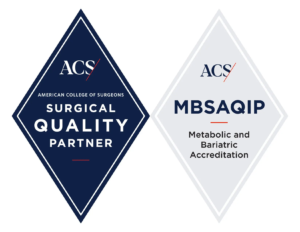For answers to your MBSAQIP questions please click here.
The American College of Surgeons (ACS) and the American Society for Metabolic and Bariatric Surgery (ASMBS) combined their respective national bariatric surgery accreditation programs into a single unified program to achieve one national accreditation standard for bariatric surgery centers, the Metabolic and Bariatric Surgery Accreditation and Quality Improvement Program (MBSAQIP).

MBSAQIP works to advance safe, high-quality care for bariatric surgical patients through the accreditation of bariatric surgical centers. A bariatric surgical center achieves accreditation following a rigorous review process during which it proves that it can maintain certain physical resources, human resources, and standards of practice. All accredited centers report their outcomes to the MBSAQIP database.
For information regarding MBSAQIP, please visit https://www.facs.org/quality-programs/mbsaqip.
About the MBSAQIP
The program accredits bariatric surgery centers in the United States and Canada that have undergone an independent, voluntary, and rigorous peer evaluation in accordance with nationally recognized bariatric surgical standards. Bariatric surgery accreditation not only promotes uniform standard benchmarks, but also supports continuous quality improvement. In the United States, more than 11 million people suffer from severe obesity and an estimated 93 million people have obesity. The comorbidities associated with obesity range from diabetes and heart disease to certain types of cancers. Bariatric surgical procedures have been shown to reduce obesity, improve mortality, and decrease the health risks from chronic diseases such as cardiomyopathy and diabetes. For these reasons, the MBSAQIP will recognize those facilities that implement defined standards of care, document their outcomes, and participate in regular reviews to evaluate their bariatric surgical programs. – See more at: https://www.facs.org/quality-programs/mbsaqip
History
The American College of Surgeons (ACS) was founded in 1913 with the goal of improving surgical care and setting standards, and the current Joint Commission (JCAHO) grew out of the ACS Hospital Standards Committee in 1951. The ACS has been accrediting trauma programs through the Trauma Verification Program since 1987 and cancer programs through the Commission on Cancer since 1930. In 2005, in response to a growing need in the bariatric surgery community, the ACS released the first Bariatric Surgery Center Network (ACS BSCN) accreditation standards manual.
The American Society for Metabolic and Bariatric Surgery (ASMBS), founded in 1983, was formed to advance the art and science of metabolic and bariatric surgery by continually improving the quality and safety of care and treatment of people with obesity and related diseases through educational and support programs for surgeons and integrated health professionals. The leadership of the ASMBS found it within their mission to release their own set of accreditation standards for Bariatric Surgery Centers of Excellence (BSCOE) in 2004, creating two separate but similar accrediting bodies for bariatric surgery.
Both programs focused on three key principles: the leadership of surgeons, the necessity for a multidisciplinary team, and the reporting of outcomes to a national registry. Accreditation was based on procedure volume, as well as other structural and process measures that provided a framework for facilities performing these types of procedures. Even discounting the impact of the introduction of laparoscopy (a change from 2.1 percent in 1998 to more than 90 percent in 2008) and inclusion in the data of the adjustable gastric band (less 30 day mortality and morbidity), the adoption of accreditation standards led to a remarkable decrease in mortality from one in 200 patients to one in 1,750 patients. The incremental improvement in safety was facilitated by the adoption of laparoscopy and inclusion of the adjustable gastric band, which has a strong safety profile at 30 days, but recent study also shows a direct result of the implementation of the programs themselves, especially in higher-risk patients. The majority of centers offering bariatric surgery programs in the United States participated in one of the two accreditation programs. Major payers endorsed the performance of metabolic and bariatric surgery within one of these centers. The data registries for both programs were under development in 2006 and in 2011 had more than 100,000 patients per year being entered into one of the two registries.
In order to transition to the MBSAQIP, in March of 2012, the ACS signed a memorandum of understanding with the American Society for Metabolic and Bariatric Surgery (ASMBS) to unify their respective bariatric surgery center accreditation programs. As of April of 2012,, all institutions that met the standards under the two separate programs—the ACS Bariatric Surgery Center Network (ACS BSCN) program and the ASMBS Bariatric Centers of Excellence (ASMBS BSCOE) program—were extended accreditation in the joint Metabolic and Bariatric Surgery Accreditation and Quality Improvement Program (MBSAQIP). The new, joint program is administered by the staff and committees of the ACS, and all centers now submit data to the existing ACS bariatric data registry.
More in this topic
Through the unification of the ACS BSCN and ASMBS BSCOE programs, a committee structure to support the MBSAQIP has been developed. The MBSAQIP committee structure consists of an overarching advisory committee and four subcommittees, residing and serving as official committees of the ACS. The Committee on Metabolic and Bariatric Surgery (CMBS), the advisory committee, serves the purpose of advising leadership on opportunities for the joint program and offers recommendations regarding operational activities related to program transition, development, and implementation of the new unified program. Four subcommittees under the advisory committee help provide support the operations of the program:
- Standards is responsible for the development of new joint accreditation standards.
- Verification validates and certifies that each individual center meets accreditation criteria.
- Data Registry and Reporting oversees the data registry and provides input on analytical and reporting tools to support the needs of the joint program.
- Quality is responsible for all activities and initiatives that involve performance improvement, collaborative work, and the sharing of best practices.
- See more at: https://www.facs.org/quality-programs/mbsaqip/about/governance
MBSAQIP Resources
https://www.facs.org/quality-programs/mbsaqip/resources
MBSAQIP FAQs
https://cqi.facs.org/faq/mbsaqip/